Top Payment Gateway APIs for Developers
Welcome to the fascinating world of Payment APIs!
Imagine you're a budding entrepreneur with a brilliant idea for an online store. You want to offer a seamless payment experience to your customers, ensuring smooth credit card transactions and hassle-free order tracking. But where do you start? That's where Payment APIs come into play!
Now, let me ask you a question: Have you ever purchased something online using your credit card? Of course, you have! Well, behind the scenes of that simple transaction, there's a complex system at work. Payment APIs are the superheroes of this system, enabling websites and applications to securely process your payment information and make that purchase a reality.
Here's a simple example to help you grasp the concept. Imagine you're buying a pair of shoes from an online store. When you proceed to checkout, you enter your credit card details and click "Pay". In an instant, the Payment API jumps into action, taking your information and securely sending it to a payment gateway.
The payment gateway then performs a series of behind-the-scenes tricks. It verifies if your credit card has sufficient funds, checks for potential fraud, and securely communicates with your bank to complete the transaction. Once everything checks out, the Payment API receives the green light and notifies the online store that your payment was successful.
But that's not all! The wonders of Payment APIs extend far beyond just facilitating transactions. Payment APIs also help businesses track orders, maintain customer lists, and protect against fraud. They provide real-time updates on transaction statuses, ensure sensitive payment data is encrypted, and help businesses stay compliant with security standards.
Now that we have a solid understanding of the concept of Payment APIs, let us explore some of the best options available and delve into their remarkable features.
Table of Contents
- What is a Payment gateway?
- Importance of Seamless Transactions
- Top Payment APIs
- Essential Considerations for Payment APIs
- Important Terms in Payment APIs
What is a Payment Gateway?
A payment gateway functions as a technological intermediary that facilitates secure and efficient transactions between online merchants and financial institutions. It serves as a vital link in the payment process for e-commerce and online businesses.
By securely transmitting payment data between customers, merchants, and payment processors, the payment gateway enables businesses to accept electronic payments, including credit card transactions, debit card payments, digital wallets, and bank transfers.
Operating as a secure conduit, the payment gateway ensures the confidentiality and integrity of payment information during transmission.

For example, when a customer initiates a purchase online, the payment gateway collects and encrypts the payment data, carefully verifying the transaction details before sending it to the payment processor or acquiring bank for authorization. Once the payment is authorized, the gateway communicates the approval or decline status to the merchant and customer, completing the transaction seamlessly.
In addition to facilitating transactions, payment gateways often offer additional features and services to support efficient payment management. These may include capabilities such as recurring billing, subscription management, fraud detection tools, and comprehensive reporting functionalities, empowering businesses to manage their payment processes effectively.
The payment gateway enables secure and smooth electronic transactions for online businesses. It acts as a trusted intermediary, ensuring the secure transmission of payment data and providing the necessary infrastructure for businesses to accept various electronic payment methods, ultimately enhancing the overall customer experience.
Importance of Seamless Transactions
Seamless transactions are significant to businesses as they directly influence customer satisfaction, conversion rates, and overall business performance. Therefore, based on relevant statistics, let's examine the significance of seamless transactions:
1. Enhanced Customer Experience
Smooth transaction processes provide a frictionless and convenient transaction experience for customers. From product selection to payment completion, it eliminates complexities, reduces unnecessary steps, and ensures a smooth process. By improving the customer experience, the brand can build customer trust, increase repeat business, and foster customer satisfaction.
2. Increased Conversion Rates
Conversion rates can decline as a result of cumbersome and complicated transaction processes.Businesses can minimize barriers to purchase, streamline the payment process, and reduce the likelihood of cart abandonment by offering a seamless checkout experience.Ultimately, this results in higher conversion rates and increased revenue.
3. Trust and Security
When a transaction process is smooth, customers feel confident about the security and reliability of their payment information.Compliance with industry standards and robust security measures reassure customers that their sensitive data is protected.Developing trust and loyalty among customers can be achieved by prioritizing data security and privacy.
4. Positive Brand Image
A brand's reputation and image are enhanced when seamless transactions are delivered. A business's growth and new customers can be greatly influenced by word of mouth recommendations and positive reviews from satisfied customers. In contrast, a poor transaction experience can negatively impact a brand's image and lead to negative reviews, resulting in lost customers.
5. Competitive Advantage
Businesses can gain a competitive advantage by offering seamless transactions in a crowded marketplace. Businesses providing a hassle-free payment experience tend to attract more customers than those with complicated or outdated processes. Differentiating themselves through seamless transactions helps businesses attract and retain customers, resulting in long-term success.
6. Mobile Commerce Growth
As mobile devices are increasingly used for online transactions, having a seamless mobile payment experience is crucial. The use of mobile-friendly interfaces, the ability to process payments quickly and securely, and the ability to integrate mobile wallets can significantly impact customer satisfaction and drive mobile commerce growth.
Top Payment APIs
The ranking of top payment APIs can vary based on factors such as industry requirements, geographical location, and specific business needs. Nevertheless, here are top 5 well-known and widely used payment APIs:
1. Stripe API
Stripe API is a robust and developer-friendly platform that enables businesses to accept and manage online payments. It provides a wide range of features and functionalities to streamline payment processing and integrate payment capabilities into applications and websites.

Key Features
- Payment Processing: Stripe API allows you to securely process credit card payments, debit card payments, and digital wallet payments (such as Apple Pay and Google Pay).
- Fraud Prevention: Stripe provides built-in fraud detection tools to help minimize the risk of fraudulent transactions.
- Developer-Friendly: Stripe offers a well-documented API with client libraries and SDKs for various programming languages, making it easy for developers to integrate and customize payment flows.
- International Support: Stripe supports payments in multiple currencies and provides localization options for different regions.
How to Get Stripe API Key
- Sign up for a Stripe account.
- Navigate to the Dashboard. In the left-hand menu, click on "Developers" and then select "API keys".
- You will find two types of keys - "Publishable key" and "Secret key".
- Paste them into your application.
Pricing
Domestic: 2% for most cards issued in India and 3% for cards issued outside of India.
International: 4.3% for cards issued anywhere. Additional 2% for currency conversion.
It's important to review the latest pricing information on Stripe's official website (https://stripe.com) as pricing plans and fee structures may be subject to change.
2. Square API
Square API is a comprehensive platform that provides developers with tools to build customized payment solutions. Square has two major API divisions that cater to different aspects of business operations. These divisions are:
- Payments API Division: The Payments API division of Square focuses on providing functionalities related to payment processing. It offers features such as processing credit card payments, managing payment details, handling refunds, and integrating payment capabilities into applications or websites.
- Square Connect API Division: The Square Connect API division is centered around facilitating integrations and interactions with Square's broader ecosystem. It includes features like OAuth-based platform integration, inventory management, order management, invoicing, and accessing various business-related data and insights.

Key Features
- Easy Credit Card Acceptance: Square was created to simplify credit card acceptance for all business owners, making it effortless to process payments from customers.
- Comprehensive Business Tools: It offers a complete suite of business tools beyond payment processing, including features for managing inventory, orders, and invoices.
- Equitable Loans: Square provides access to fair and accessible loans, ensuring that eligible businesses, regardless of their size or background, can access funding to support their growth.
- Support for Diverse Businesses: From small side gigs to large sports stadiums, Square supports businesses of all types and sizes, empowering them to succeed on their own terms.
- Flexible Tools: Square offers a wide range of flexible tools that cater to various business needs, allowing you to choose the ones that specifically serve your requirements.
- Pay for What You Need: With Square, you only pay for the tools and services you require, ensuring that you have cost-effective solutions without unnecessary expenses.
- Integration with Third-Party Technologies: Square seamlessly integrates with numerous third-party technologies, saving you time and enabling you to work with your preferred tools and systems.
- Intuitive Dashboard: The intuitive Square Dashboard consolidates all your business data in one place, providing real-time reports, customer contacts, and comprehensive information to make informed business decisions and plan for the future.
How to Get Square API Key
- Sign up for a Square account.
- Go to the Square Developer Dashboard.
- Create a new application and provide necessary details.
- Access the application settings and find your API keys.
- Copy the API key for sandbox or production use and store it securely.
Pricing
Kindly do visit Square's official website (https://squareup.com) or contact their sales team to get accurate and up-to-date information on pricing plans, fees, and specific details regarding the Square API.
3. PayPal
PayPal is a widely used payment system that provides a secure way to store credit card and bank account information on trusted servers. With the PayPal API, businesses can accept payments from PayPal users. The advantage is that you don't need to store sensitive financial credentials on your server, ensuring high-security payments even on low-security websites.

Key Features
- PayPal facilitates international transactions, allowing you to send and receive money across borders.
- PayPal offers buyer protection for issues like non-delivery or receiving significantly different items, and seller protection against unauthorized transactions and fraudulent buyers.
- It supports multiple currencies and offers competitive currency conversion rates. This makes it convenient for businesses and individuals engaged in global commerce.
- PayPal's mobile app, available for both iOS and Android devices, empowers users to conveniently make payments, send money, and manage their accounts while on the move, offering a user-friendly and seamless experience.
How to Get PayPal API Key
- Go to the PayPal Developer website and log in to your PayPal account.
- Access the "Dashboard" section and click on "My Apps & Credentials" in the sidebar.
- Select "Create App" under the "REST API apps" section.
- Provide a name for your app and choose the account you want to use for the API integration.
- Click "Create App" to generate your API key, which you can find under the "Live" column. Remember to keep your API key secure for authentication purposes.
Pricing
- Personal Accounts: Creating a personal PayPal account is free. Sending money or making purchases using your PayPal balance or linked bank account is also free. However, fees may apply for certain transactions, such as receiving payments for goods and services or currency conversions.
- Business Accounts: PayPal offers various business account types, including PayPal Payments Standard, PayPal Payments Pro, PayPal Here, and PayPal for Marketplaces. Each account type has its own pricing structure and features.
To obtain detailed information about PayPal's fees, please visit the PayPal website.
4. Razorpay
Razorpay stands out among payment gateways in India for its comprehensive suite of products that enable businesses to accept, process, and disburse payments.

It stands out as it provides access to various payment modes, including credit cards, debit cards, net banking, UPI, and popular digital wallets like Airtel Money, FreeCharge, JioMoney, PayUmoney, Ola Money, Mobikwik, and PayZapp.
Key Features
- Razorpay prioritizes security and compliance, implementing advanced security measures such as encryption and tokenization to protect sensitive customer information.
- One of the notable aspects of Razorpay is its impressive user interface (UI), which provides a smooth and user-friendly experience for both businesses and customers.
How to Get Razorpay API Key
- Sign up for an account.
- Access the Dashboard.
- Navigate to Settings.
- Generate the API key.
- Safeguard the key.
The API key is essential for integrating Razorpay's API into your applications or website.
Pricing
- The annual maintenance charge for Razorpay is zero, and there is no one-time setup fee.
- The transaction fee per successful transaction is 2%.
To know more about the pricing details, please do check the webite.
- Pricing for Payments
- Pricing for Banking
5. Adyen
Adyen is a payment service provider that offers credit card processing and hosts payment forms for sellers. It provides a single, unified platform that enables businesses to accept payments across various channels, including online, in-store, mobile, and through various payment methods.
Adyen’s platform lets you expand quickly, manage risk, and track results – one platform, one partner, no hassle.
How to Get Adyen API Key
- Sign in https://ca-test.adyen.com/ca/ca/login.shtml
- Navigate to Settings --> User.
- Copy your credentials.
Pricing
Adyen's pricing structure is customizable and tailored to each business's specific needs and requirements. To get detailed information about Adyen's pricing and to receive a personalized quote, it is recommended to contact their sales team directly or visit their official website for more information.
Essential Considerations for Payment APIs
When selecting a payment API for your business, it's important to take into account several key factors to ensure you make an informed decision. Here are some crucial considerations:
- Security and Compliance: Prioritize the security of your payment transactions. Verify that the payment API adheres to industry standards like PCI DSS (Payment Card Industry Data Security Standard) and offers robust encryption and tokenization methods to protect sensitive customer data. Look for built-in fraud detection and prevention features to safeguard against unauthorized transactions.
- Developer-Friendly Integration: Evaluate the ease of integrating the payment API and the availability of comprehensive documentation and developer resources. A well-documented and developer-friendly API will shorten the implementation time and make it easier for your development team to integrate the payment solution into your existing infrastructure. Seek features like SDKs (Software Development Kits) and well-documented APIs with clear examples and code snippets.
- Scalability and Reliability: Consider the scalability and reliability of the payment API. It should handle your current transaction volume and seamlessly scale as your business expands. Look for high-availability APIs, redundant infrastructure, and robust load-balancing capabilities to ensure uninterrupted payment processing.
- Pricing: Understand the payment API's pricing structure and fee model. Evaluate factors such as transaction fees, monthly charges, setup costs, and additional value-added services fees. Assess the overall cost implications and ensure the pricing aligns with your business requirements and budget.
- Supported Payment Methods: Assess the payment methods supported by the API. Ensure it can handle major credit and debit cards, popular digital wallets, and alternative payment methods relevant to your target market. Various payment options enhance customer convenience and lead to higher conversion rates.
- Integration with Existing Systems: Evaluate the compatibility and integration capabilities of the payment API with your current systems, such as your website, e-commerce platform, or POS (Point of Sale) system. Smooth integration minimizes development efforts and reduces disruptions to your existing workflows.
- Customer Support and Service Level Agreement (SLA): Consider the level of customer support provided by the payment API provider. Look for available round-the-clock support, dedicated account managers, and a responsive support team to address any issues or queries promptly. Review the SLA to understand the guaranteed uptime and response time in case of service interruptions.
- Reputation and Reviews: Conduct thorough research on the reputation and user reviews of the payment API provider. Seek feedback from existing customers regarding the API's performance, reliability, and customer support. Consider reaching out to other businesses in your industry or online communities to gather insights and recommendations.
Important Terms in Payment API
- Application Programming Interface (API): An API is a set of rules and protocols that allows different software applications to communicate and interact with each other.
- Payment Gateway: A payment gateway is a service that handles the authorization and processing of online transactions, securely transferring payment data between a website and a payment processor or acquiring bank.
- API Key: An API key is a unique code or token provided by a service provider to authenticate and authorize access to their API. It acts as a security measure to ensure that only authorized users or applications can make API requests.
- Transaction ID: A transaction ID is a unique identifier assigned to each individual transaction processed through the payment API. It helps in tracking and referencing specific transactions for record-keeping, reconciliation, or customer support purposes.
- PCI Compliance: Payment Card Industry (PCI) compliance refers to adhering to a set of security standards and practices established by the PCI Security Standards Council to protect cardholder data during payment transactions. It ensures that businesses maintain a secure environment for handling payment information.
- Chargeback: A chargeback occurs when a customer disputes a charge and requests a refund directly from their bank or credit card issuer. It initiates a process where funds are returned to the customer's account, and the merchant may need to provide evidence to dispute the chargeback.
Conclusion
For businesses to achieve smooth and hassle-free transactions, top payment APIs must be integrated. In order to select the most suitable API for their unique needs, businesses should carefully consider factors such as security, scalability, pricing, and supported payment methods.
Implementing the right payment API can boost conversion rates, improve security protocols, and simplify payment processes. It empowers businesses to provide customers with diverse payment options, elevate the overall user experience, and foster trust and reliability.
Businesses need to stay on top of future trends in payment APIs to remain competitive in the ever-evolving digital landscape. With advancements in technology, payment APIs will introduce new features that streamline transactions.
Business can stay ahead of the curve, exceed customer expectations, and drive growth in today's digital economy by constantly evaluating and adapting to these advancements. Transactions executed seamlessly with top payment APIs not only become a necessity for businesses but also act as catalysts for success, customer satisfaction, and long-term growth.
Atatus API Monitoring and Observability
Atatus provides Powerful API Observability to help you debug and prevent API issues. It monitors the consumer experience and is notified when abnormalities or issues arise. You can deeply understand who is using your APIs, how they are used, and the payloads they are sending.

Atatus's user-centric API observability tracks how your actual customers experience your APIs and applications. Customers may easily get metrics on their quota usage, SLAs, and more.
It monitors the functionality, availability, and performance data of your internal, external, and third-party APIs to see how your actual users interact with the API in your application. It also validates rest APIs and keeps track of metrics like latency, response time, and other performance indicators to ensure your application runs smoothly.
#1 Solution for Logs, Traces & Metrics
APM
Kubernetes
Logs
Synthetics
RUM
Serverless
Security
More



